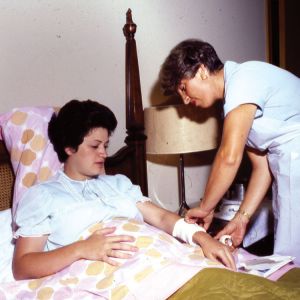The generation that remembers financial fear of hospitals is now in its 70s and the mostly unwritten history of medicare is more complex than praise for former Saskatchewan premier Tommy Douglas. In Ontario, former Catholic Charities head Msgr. John G. Fullerton helped write an important chapter in the evolution of universal public health care in Canada.
In 1956 premier Leslie Frost headed up a divided Ontario government as it began to consider its options for some form of universal hospital insurance. Frost needed to assuage the business community and members of his own party who looked upon expansion of the welfare state as the thin edge of a wedge of socialism invading Canada, undermining a free-enterprise society.
The insurance industry was trying to convince governments there was no need for a government program if the government would subsidize private insurers. But in 1955 Frost had pushed the federal government of Louis St. Laurent to live up to campaign promises to propose some kind of hospital insurance. Frost had been cut off by his own private insurer and saw the issue quite differently from many of his colleagues.
By 1956 federal legislation was in the works, but Frost couldn’t steam roll over his own party to get Ontario into the federal cost-sharing system. Thus he picked three former presidents of the Ontario Hospital Association to form the Ontario Hospital Services Commission. Fullerton — head of Catholic Charities and former chair of the board of St. Joseph’s Hospital — was vice chair.
“It would have been impossible for (Frost) to create a commission without Catholic representation,” said Greg Marchildon, Canada Research Chair in public policy and economic history at the University of Regina. “The Catholic hospitals were important.”
You could always count on the Catholic hospitals to take on charity cases. There were provincial schemes across the country that partially compensated charity hospitals for treating patients the private hospitals wouldn’t touch. But it was wholly inadequate.
The provincial commission did its job of taking some of the political heat off Frost while the federal government passed the Hospital Insurance Diagnostic Services Act in 1957, to take effect in 1958. But the commission also made sure that Ontario would join the system in 1959.
“Without Ontario deciding they wanted it, this would have never happened,” said Marchildon, a leading expert on the history of medicare.
Hospital insurance was only the first stage. Doctors’ visits and other services were still in private hands until 1966.
Recommending universal health care put Fullerton on one side of a bitter and tempestuous debate in Canadian society and in the Church.
“The opposition to medicare was intense,” said Marchildon. “It’s the most contentious history imaginable.”
Conservative voices in the Church were summed up in a March 23, 1957 Catholic Register editorial.
“The welfare state must eventually become the totalitarian state, which has in its success the seeds of its own destruction,” wrote Fr. J.G. Hanley in a signed editorial.
Progressive Catholics, often acting in concert with Protestants, were less afraid of socialism and invoked papal encyclicals.


